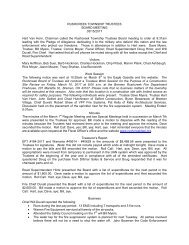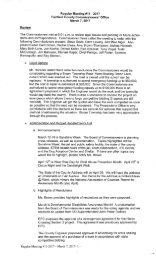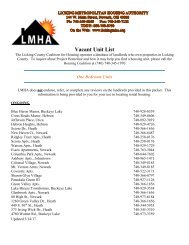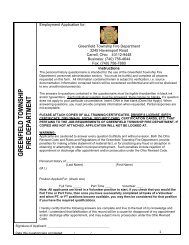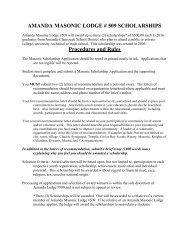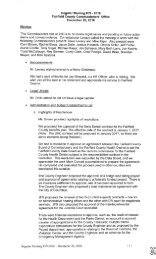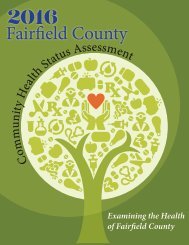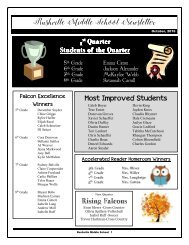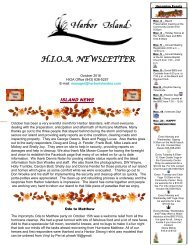William V Fisher Catholic High School
2016-2017-Student-Handbook
2016-2017-Student-Handbook
You also want an ePaper? Increase the reach of your titles
YUMPU automatically turns print PDFs into web optimized ePapers that Google loves.
• The school will work to establish linkages between health education, school meal<br />
programs, and related community services.<br />
Nutritional Quality of Foods and Beverages Sold and Served at <strong>School</strong><br />
A. <strong>School</strong> Meals<br />
Meals served through the National <strong>School</strong> Lunch Programs will:<br />
• Be appealing and attractive to children<br />
• Be served in clean and pleasant settings<br />
• Meet, at a minimum, nutrition requirements established by local, state, and federal<br />
statutes and regulations<br />
• Offer a variety of fruits and vegetables<br />
• Serve only 2%, 1% or skim milk and nutritionally equivalent non-dairy alternatives<br />
(to be defined by USDA); and<br />
• Strive to ensure that half of the served grains are whole grain<br />
The school will follow the U.S. Dietary Guidelines for Americans content of meals and share<br />
with parents and students. Such information should be made available by the school food service<br />
on menus, the FCHS website, cafeteria menu boards, placards, or other point-of-purchase<br />
materials.<br />
B. Meal Times and Scheduling. <strong>School</strong>s:<br />
● Will provide students with enough time to eat breakfast and lunch (suggested<br />
time would be approximately 20 minutes after sitting down for lunch)<br />
● Should schedule meal periods at appropriate times, lunch should be scheduled<br />
between 10 a.m. and 1 p.m.<br />
● Should not schedule tutoring, and/or club, or organizational meetings or<br />
activities during mealtimes, unless students may eat during such activities<br />
● May provide students access to hand washing or hand sanitizing before they<br />
eat meals or snacks. (Addendum A)<br />
1. <strong>School</strong> Food Service Staff. Food service personnel will administer the school meal<br />
programs. As part of the school district’s responsibility to operate a food service<br />
program, we may provide continuing professional development for food service<br />
personnel in schools. Staff development programs should include appropriate<br />
certification and/or training programs for child nutrition directors, school nutrition<br />
managers, and cafeteria workers, according to their levels of responsibility.<br />
2. Sharing of Foods and Beverages. FCHS should discourage students from sharing their<br />
foods or beverages with one another during meal times, especially given concerns about<br />
allergies and other restrictions on some children’s diets.<br />
C. Competitive Foods (i.e., foods sold outside of reimbursable school meals, such as<br />
through vending machines, fundraisers, school stores, etc.)<br />
At FCHS: Competitive foods should not be sold to students anywhere on school premises<br />
until after the last scheduled lunch period. This does not pertain to food items made available<br />
by the school food service department. All foods and beverages sold individually outside the



